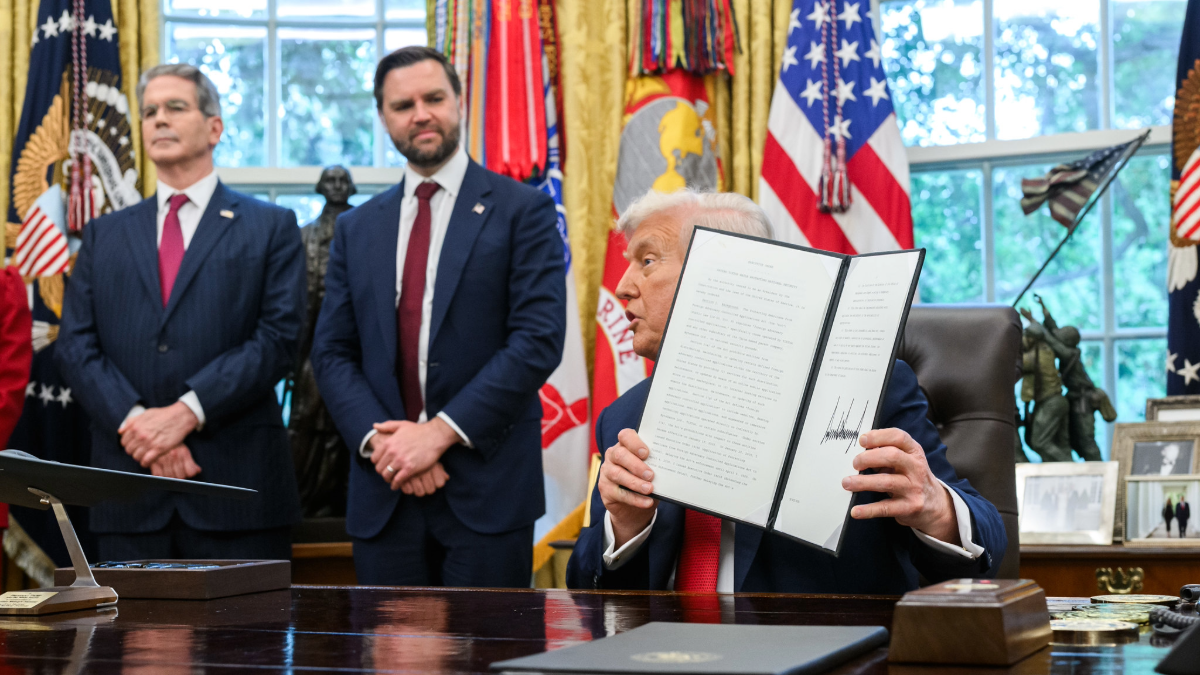In the Social Media Wars, Washington, Not Brussels, is the Victor
Mark Scott / Oct 10, 2025Mark Scott is a contributing editor at Tech Policy Press.

President Donald Trump holds a signed executive order allowing a US deal for TikTok, Thursday, September 25, 2025, in the Oval Office. (Official White House photo by Joyce N. Boghosian)
In a world dominated by social media, Washington and Brussels are taking vastly different approaches to corral these new Masters of the Universe.
In Washington, the United States is on the verge of wresting TikTok’s American operations out of the hands of ByteDance, its China-linked parent company. Details of the proposed $14 billion deal are sketchy. But a White House executive order explained how US investors would take the helm of one of the country’s most important social media platforms under a scheme the Trump administration claimed would ward off national security threats and keep Americans’ data secure from China.
In Brussels, the European Union is two years into the implementation of its Digital Services Act (DSA). That includes reams of ongoing investigations, risk and transparency reports and lengthy audits into how global platforms — including TikTok — safeguard people’s fundamental rights and protect individuals from illegal content. Despite a focus on US social media giants, the majority of early-stage charges under the DSA have targeted Chinese firms like Temu, ByteDance and AliExpress.
This transatlantic split on digital governance is driven by contradictory goals from EU and American officials.
For the US, the aim is to hobble a geopolitical rival in China — a stated aim of the lawmakers that crafted the legislation requiring the TikTok divestiture, which raised concerns Beijing would use TikTok to spread propaganda across the US. ByteDance denies that allegation.
For Europe, the goal is to hold some of the world’s most powerful companies accountable for their internal trust and safety policies. That’s an area all firms have pulled back on, including laying off, collectively, tens of thousands of workers, as well as reneging on online safety and transparency commitments.
So far, it’s Washington — not Brussels — that has proven more successful in achieving its goals for platform governance.
The White House and ByteDance have yet to announce details on the proposed deal to “Americanify” TikTok’s US operations. In public statements, President Trump said billionaires including Oracle’s Larry Ellison, Michael Dell and Lachlan Murdoch would be involved in the new corporate structure. ByteDance’s ownership of the US unit would be reduced to less than 20 percent.
“This is going to be American operated all the way,” Trump told reporters in the Oval Office.
Yet Washington’s strategy is clear.
Both Republican and Democratic administrations have sought to rid TikTok’s US operations from the still-unproven risks that China will use the social media company to collect sensitive data on American citizens and pepper US-based users with Chinese propaganda. US officials claim the national security risks are too severe to allow China-linked ByteDance to remain in control of a platform now used by 170 million people across the US.
If the $14 billion sale of TikTok’s US unit is confirmed — and that is still only a possibility, despite the White House announcing its plan on September 25 — then Washington will have achieved that goal.
It will have put Americans in control of the country’s fastest-growing social media network. It will have reduced ByteDance’s ownership stake, even though the China-linked firm vehemently denies it’s in hock to the Chinese Communist Party. It will have put Beijing on notice about who’s in control of the US’ infatuation with social media, although questions are still unanswered about who will own TikTok’s underlying content algorithms.
Contrast that strategy with what is unfolding across the Atlantic.
More than two years since the EU’s new online safety rulebook came into force, the 27-country bloc’s DSA is more aspiration than hard-nosed regulation.
Brussels has stumbled in enforcing the rules. That includes claims that Thierry Breton, the former European Commissioner initially in charge of the new rules, played fast and loose with the initial investigations. The French politician also waded into Elon Musk and Donald Trump’s discussion on X ahead of the 2024 US presidential election — leading to unfounded claims from some in Washington that the DSA was aimed at silencing free speech in America.
On more practical terms, the DSA has failed to meet the EU’s objectives of holding social media giants to account.
The likes of Meta and Alphabet pulled back on commitments under the rulebook associated with fact-checking. X blocked outside researchers from accessing the platform’s publicly-available data. Levels of illegal content, foreign interference and online hate remain high, based on external reports, despite the European Commission spending tens of millions of dollars on enforcement and national regulators from Dublin to Greece also empowered to implement the DSA within their borders.
Many of the American social media giants have similarly contributed to the White House’s claims that international online safety rules, especially those from the EU, represent an unfair transatlantic trade barrier and an illegal attack on the US free speech.
Confronted with this transatlantic reality, it’s hard not to see Washington as the victor in growing efforts by governments to gain greater control over social media.
The US’ aims are primarily focused on national security, while those of the EU are centered on transparency and accountability. The former is couched in the realpolitik between the world's largest economies. The latter in Europe’s ambition to create a regulatory “Third Way” between China’s authoritarianism and the US’s hands-off approach to digital rulemaking.
In that context, Washington’s ability to shake TikTok’s US operations from out of ByteDance’s control, pending the completion of the $14 billion divestiture, must be seen as a bipartisan win, based on the apparent political consensus within the Beltway that China represents an existential threat to national security.
In contrast, the EU has failed to notch similar successes in its own ambitions to tame social media.
Authors
